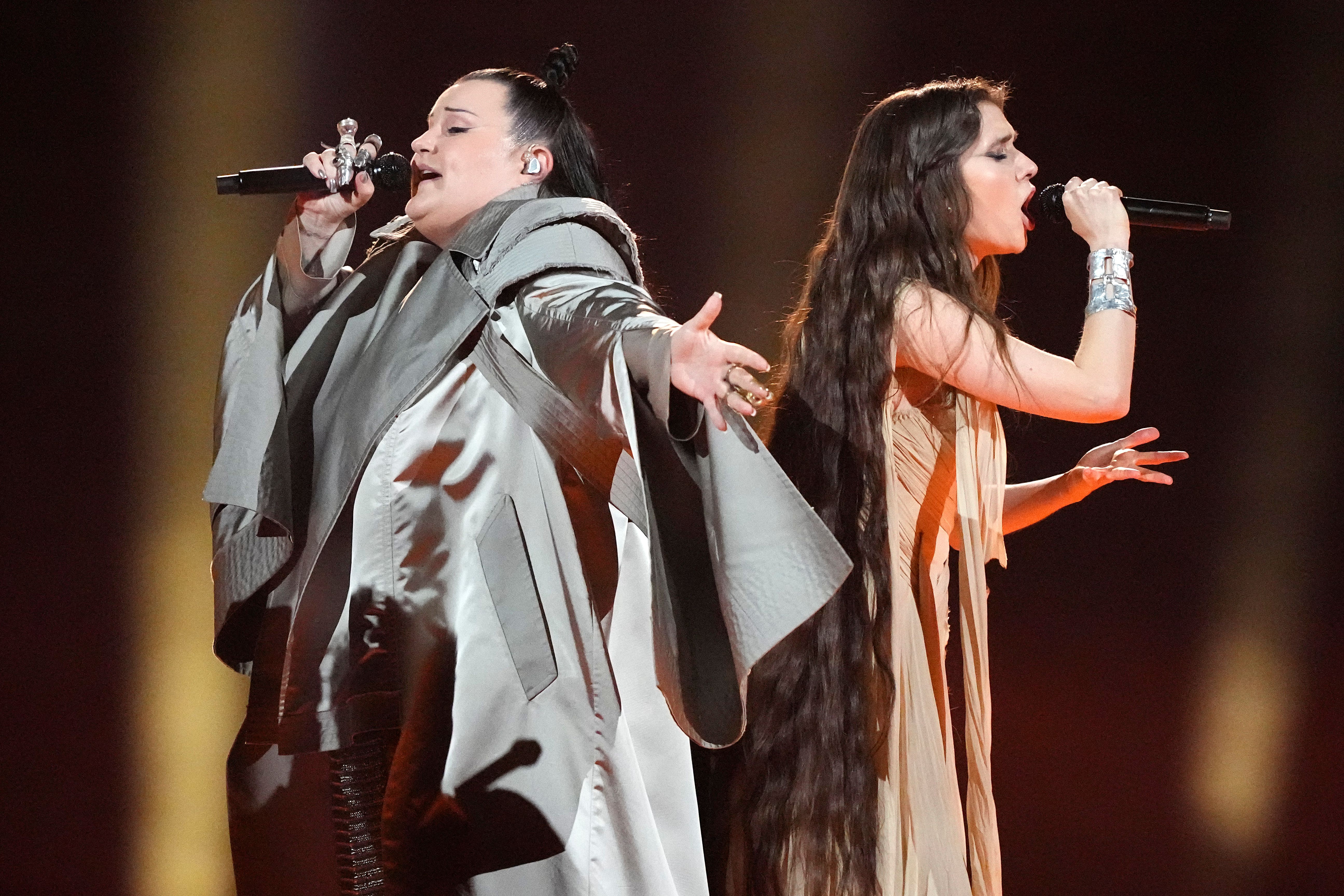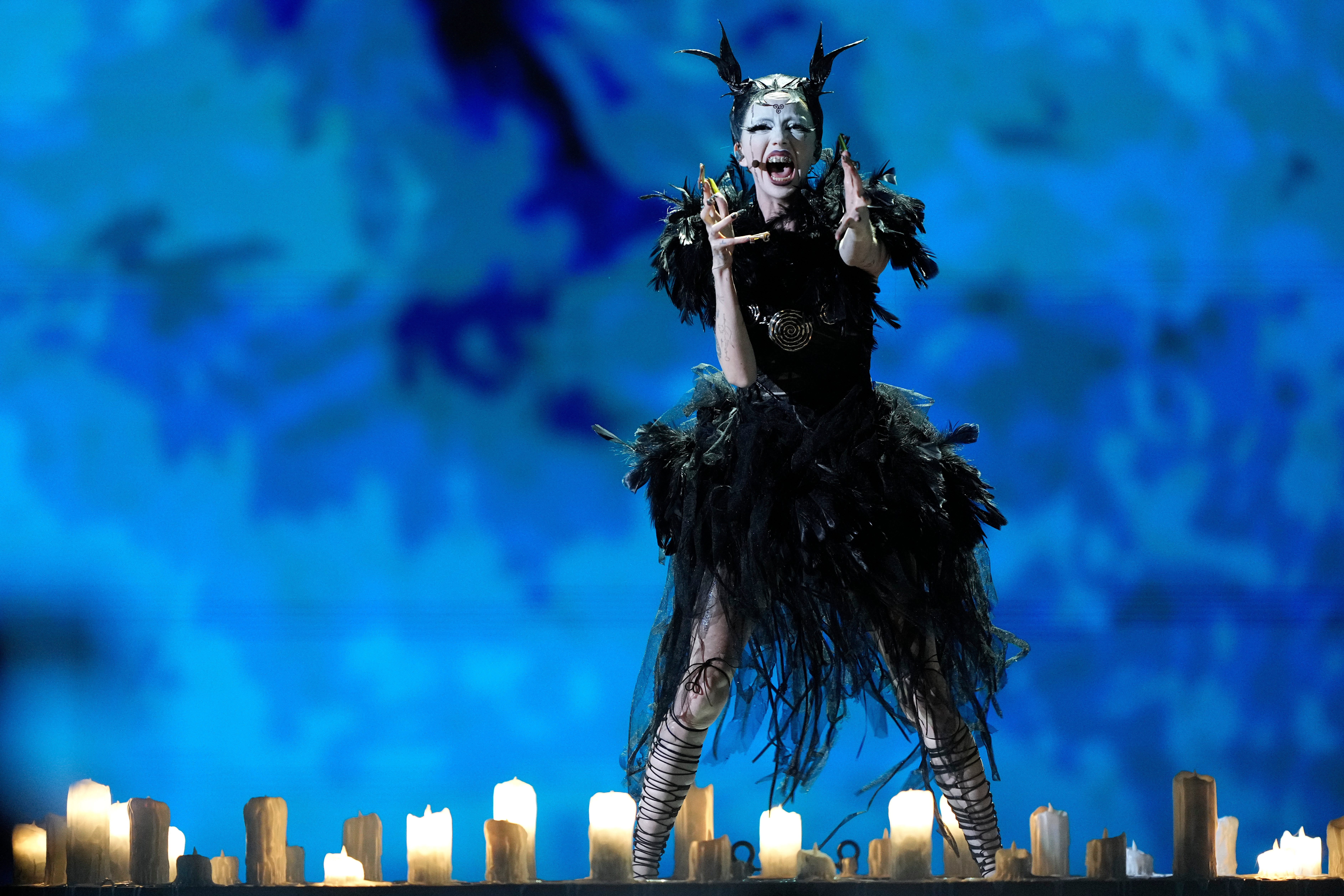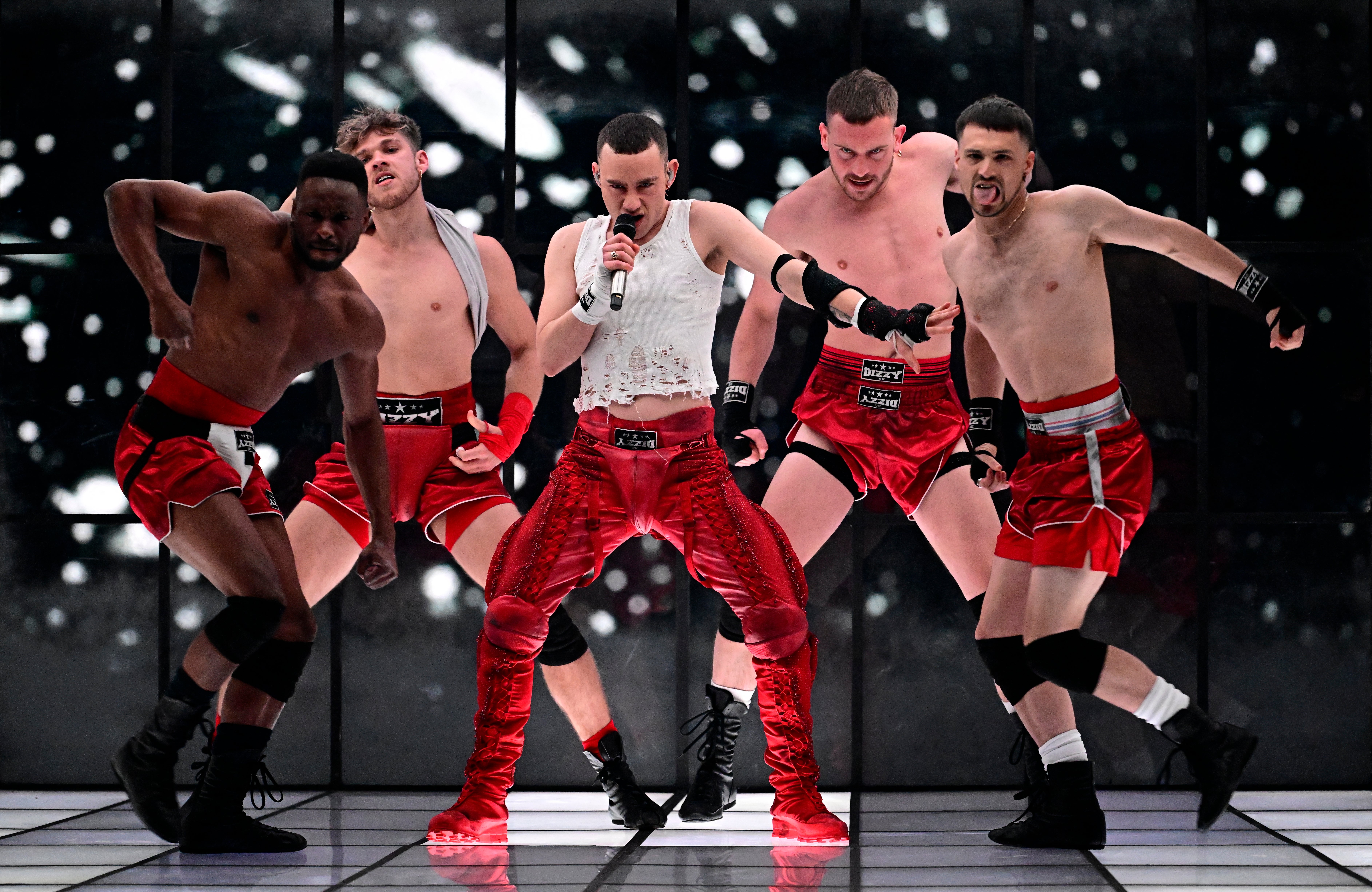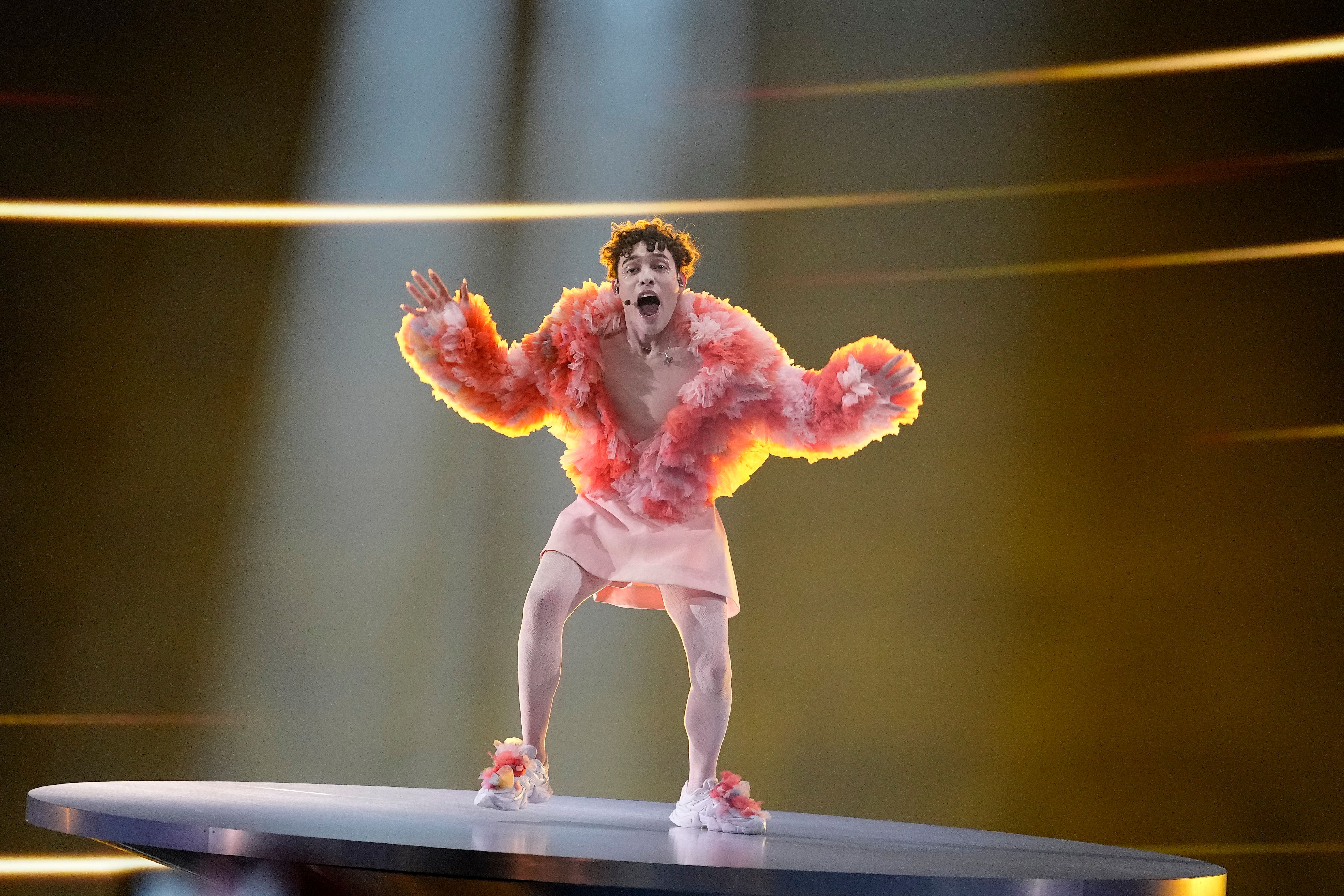Eurovision 2024 review: Contest unfolds under the darkest shadow in its history
After banning Russia, Eurovision organisers painted the song contest and its ‘anti-political’ ethos into a corner
Graham Norton had his work cut out keeping this one light. There were breakdowns, blood rites, curses, drug busts, infidelities aplenty and great howls of existential anguish, and that’s just the songs. Draw the camera back from its tight crop on the gritted-teeth performances and Eurovision 2024 arrives under the darkest shadow of the contest’s entire history.
When organisers disqualified Russia over opaque rule-breaking and “the violation of public service values” in 2022, allowing for widespread displays of solidarity with Ukraine from both public and voting panels, they painted Eurovision and its anti-political ethos into a corner. Now this year’s ceremony arrives at a precise moment in history when it becomes the last chance for high-profile global protest. As the tanks threaten to roll into Rafah, where 1.4 million starving Palestinian civilians have been kettled, Eden Golan strides onto the Eurovision stage to represent Israel with a stirring and angelic battle ballad “Hurricane” that’s plenty good enough to win. But the fallout has effectively torn the Eurovision spirit to shreds.
A 10,000 strong pro-Palestinian march took place through Malmo in Sweden, with Greta Thunberg among the protesters calling Israel’s participation an “artwash”. Viewing parties across Europe were cancelled amid calls for a fan boycott. Signs of solidarity with Palestine have been meticulously erased from the event, right down to the words “freedom” and “ceasefire” that Ireland’s “goth gremlin” Bambie Thug planned to have written on their body in ancient Irish Ogham script. Though – it pains me to have to point out – clearly not in charge of Israeli government policy herself and undeserving of any abuse for it, Golan was roundly booed by the Malmo Arena in rehearsal, a Finnish jury stand-in refused to give their allotted 12 points to Israel during the mock-voting rehearsal and several jury announcers have withdrawn.
Meanwhile, with complaints and accusations flying, the atmosphere backstage was said to have been on a knife-edge. Italy’s entry Angelina Mango even sang an impromptu version of John Lennon’s “Imagine” to the press in the name of “letting the music speak”. And most shocking of all – and quite possibly unrelated – was the last-minute disqualification of Netherland’s jocular entry Joost Klein and his song “Europapa”. Encapsulating what The Prodigy might be like if a sentient Mr Potatohead, styled by David Byrne, had replaced Keith Flint, Klein was one of the favourites until he was axed from the show for allegedly threatening a female TV crew member. Gag your way round that one, Norton.
Yet, despite gaping fractures in its façade of international musical unity, the show went on. After a flag parade to a medley of Sweden’s formidable pop hits, beneath the now ironic slogan “UNITED BY MUSIC”, Sweden’s identical twins Marcus & Martinus kicked off proceedings with a cyber-colour rave pop performance that looks like The Cube has taken MDMA, setting a fittingly dark tone for the evening. Their song, “Unforgettable”, is dedicated to a “dangerous” lover who’ll eat your soul, blind your eyes and infect you with her “venomous” love. Eurovision’s post-show duty of care should probably extend to hypnotism therapy to help them forget her.
Ukraine’s entry “Teresa & Maria”, delivered like a Biblical fantasy epic, is a collaboration between two of the country’s biggest stars – rapper Alyona Alyona and YouTube singer-songwriter Jerry Heil – which cites Mother Theresa and the Virgin Mary as symbols of the divinity within humanity and inner happiness despite overwhelming struggle. Which all leaves Germany’s Rag’n’Bone Man Isaak laying it on a bit thick with “Always on the Run”, an EDM R&B bawler with lyrics about being “lost in my own identity” and “haunted by the voices deep within” that could have been scratched into a padded wall. So deep are his hardships, he even has to perform from inside a homeless shelter that’s on fire.

But, without a “Europapa” to lighten the mood of the first half hour or so, these are virtual Subwoofers compared to what’s to come. The 2023 triumph of Sweden’s Loreen, the diabolic result of crossing a human with Predator, has opened Eurovision’s horror pop floodgates. Serbia’s Teya Dora croons her cinematic pain pop like a siren on a midnight rock, all loneliness and sleepless anxiety as “the night frightens the day from arriving”. Slovenia’s Raiven, a classically trained harpist and opera singer back home, emerges like a lascivious Lady of the Lake, tended to by writhing, flesh-panted dancers.
Norway’s Gate are like a haunted forest come to life and gone synth metal, shredding their nyckelharpas and wailing at the moon in rapturous paroxysms like one of those pagan woodland sex cults that Scandinavia has instead of dogging. Their “Ulveham” (or “Wolf Man”) is the grimmest of fairy tales in which an evil stepmother turns the protagonist into a sword, only to be freed of the curse when they slaughter their own brother. “I then tore out her heart so her blood flowed free, then I got to drink my brother’s blood,” howls Gunnhild Sundli (in translation). Have we tuned in to live footage from Bloodstock by mistake?
That’s not even the scariest of it. Bambie Thug’s demoncore performance of “Doomsday Blue” has sparked a lot of “down with this sort of thing” protest in Ireland thanks to this non-binary devil fawn casting hexes, invoking the Harry Potter “Killing Curse” and dancing around a pentagram with a fanged fiend. They light ceremonial candles with a flick of their bejewelled claws, gets stripped to a trans flag hellkini, and it all ends with what appears to be an actual screaming exorcism. At which point Eurovision arguably becomes the most satanic televisual event until ITV finally commissions An Audience With Satyricon.

It’s Finland’s Windows95man (whom journalistic form requires me to clarify as DJ and visual artist Teemu Keisteri, but I wouldn’t bother remembering that) who really falls on Eurovision’s classic novelty sword. His performance of “No Rules!” is essentially an electropop operetta following the allegorical story of one man – a Duffman-esque roadshow DJ, born from a giant denim egg – and his eternal search for trousers. “Is there something wrong with who I am?” sings an associate dressed as a Wonder Mop, while an Austin Powers skit plays out at length to convince us, through masterful masking camerawork worthy of Hitchcock at his peak, that Windows95man has got his nadgers out.

Otherwise, it’s Eurovision as usual. Of the half-dozen countries sending local talent show starlets with electropop songs about surviving toxic relationships, a few stand out. Kaleen’s “We Will Rave”, representing Austria, is a genuine world-class laser rave anthem. Mango’s “La Noia” at least declares “I’m happy as a clam, look, zero dramas” (thank God!) before detailing her music industry exploitation and how “I die because dying makes the day more human”. Marina Satti delivers a refreshingly Grecian take on Jamaican dancehall on “Zari” and Spain’s Nebulosa transport us back to any given Madonna tour of the Eighties or Nineties: singer Maria Bas declaring herself a “postcard bitch” while being pawed on bordello banquettes by half-naked, bearded dancers in buttock throttling corsets. Honourable mention also goes to Armenia’s Ladaniva who, with “Jako”, throw back to the classic Eurovision standard of bunging some euro beats on a regional folk song, some sequins on their traditional dress and a pipe solo on the second chorus.

Our own Olly Alexander lifts the mood with “Dizzy”, performed in a homoerotic East End gym where gravity has lost all meaning and not half as bad as we’ve been led to believe. But he pales next to Croatia’s Baby Lasagna, a bandy-legged metal Mozart fronting a loose collective of balaclava insurrectionists and S&M babushkas, proffering a ridiculously catchy pop metal tune (“Rim Tim Tagi Dim”) about a farm boy selling his cow and moving to the big city to seek his fortune. And, of course, to the operatic gabba brilliance of Switzerland’s Nemo, essentially the Phantom of the Opera if they were haunting a theatre showing Priscilla Queen of the Desert.

Golan receives what Norton tactfully describes as “a mixed reception” in the arena and is mid-tabled by the juries, but tops the table briefly thanks to the public vote. Still, Nemo sweeps to a victory that wouldn’t have had even Loreen biting a nail. And despite resounding boos for both the Israel jury and Eurovision chief Martin Osterdahl, the policy of slapping on a rictus grin, throwing to the Abbatars whenever possible and just getting through it successfully papers over the cracks of Eurovision 2024. “I hope this contest can continue to live up to its promise and stand up for peace,” Nemo says, speaking for the continent as they lift the trophy. Heads might well roll, but on that note the spirit of Eurovision can be rebuilt.
Bookmark popover
Removed from bookmarks